|
|
|
Sort Order |
|
|
|
Items / Page
|
|
|
|
|
|
|
| Srl | Item |
| 1 |
ID:
086578
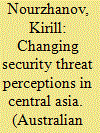

|
|
|
|
|
| Publication |
2009.
|
| Summary/Abstract |
This article discusses the current process of securitisation in Central Asia and identifies its convoluted and faulty nature as a factor impeding collective security action in the region. It uses the Regional Security Complex Theory (RSCT) as an explanatory tool and posits that security discourse in - and about - the five former Soviet republics is dominated by geopolitical grand strategy on the one hand and by particularist concerns about lack of democracy or transnational threats on the other. Issues of conventional security involving two or more states, such as territorial disputes or resource management, are pushed aside and rarely securitised at the official level. The article outlines conceptual and institutional reasons for this bias, and argues that unless inter-state tensions are properly analysed, debated and addressed, the prospects for security and stability in the region will remain grim.
|
|
|
|
|
|
|
|
|
|
|
|
|
|
|
|
| 2 |
ID:
121687
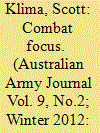

|
|
|
|
|
| Publication |
2012.
|
| Summary/Abstract |
The many pressures and competing requirements of the modern sub-unit commander
can easily see the commander's attention only fleetingly focused on what should be the
primary role of his unit: combat. It is easy for a modern commander in today's corporate
governance-driven training environment to comply with the administrative reporting,
resource management, risk mitigation and non-linear command structure necessities, and
in so doing losing that essential mindset that will enable those he commands to win the
fight. The purpose of this article is to look at what our role should be as soldiers, or more
importantly as commanders of soldiers, as we prepare to fight and survive on the battlefield
of today's hybrid threat environment.
|
|
|
|
|
|
|
|
|
|
|
|
|
|
|
|
| 3 |
ID:
140253
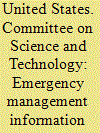

|
|
|
|
|
| Publication |
Washington, US Government Printing Office, 1981.
|
| Description |
iii, 302p.pbk
|
|
|
|
|
|
|
|
|
|
|
|
Copies: C:1/I:0,R:0,Q:0
Circulation
| Accession# | Call# | Current Location | Status | Policy | Location |
| 022058 | 658.477/UNI 022058 | Main | On Shelf | General | |
|
|
|
|
| 4 |
ID:
149600


|
|
|
|
|
| Summary/Abstract |
This paper uses a case study of fisheries co-management in Hawaii to explore barriers to community participation in resource management and the reasons for these impediments. Our study suggests that while fishers may disobey regulations to maximise personal gain, they may also understand the necessity for regulations and desire more stringent enforcement. This seeming paradox reflects the tension between a recognised need to conserve resources through restricting harvests and competitive pressure among individual fishers. When fishers observe insufficient enforcement on the part of government agencies, this may fuel an already present sense of disrespect for and distrust of the government, inhibiting community participation in co-management efforts. This study suggests that rather than attempting to directly encourage community members to participate in co-management efforts, managers should instead focus on enhancing enforcement to alleviate communities' frustration and disrespect. Thus, enhanced enforcement efforts may boost participation in management activities and lead to a more sustainably managed resource.
|
|
|
|
|
|
|
|
|
|
|
|
|
|
|
|
| 5 |
ID:
184239
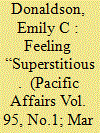

|
|
|
|
|
| Summary/Abstract |
For many Indigenous peoples, ancestral lands are a source of nourishment, strength, and sovereignty that counteracts colonial legacies of violence and hegemony. However, the feelings associated with place and the land can also be complicated by embodied fear and ambivalence. What happens when the remnants of colonialism feed feelings of ambivalence, shame, or fear of the land? How do these lasting emotional scars on Indigenous minds and bodies impact Native place making, today? This paper problematizes the role of ancestral lands and affective place making in shaping Indigenous identity, sovereignty, resource management, and sustainability. In the Marquesas Islands of French Polynesia, ancestral places are felt as much as seen, and the spirits that dwell there can be dangerous. The active concealment of these Marquesan reactions and relationships to place illustrates the blending of colonial and Indigenous histories and values in ambivalent, affective experiences on the land. Thus, even as islanders work to revitalize their traditional culture and build a sustainable future based on ancestral places, reticence complicates local relationships to the land and the vital hopes they represent. As global sustainability efforts emphasize the conservation of lands inhabited by Indigenous communities, recognizing the conflicted, emplaced emotions and experiences of local peoples will be a key part of understanding such areas and how to preserve them.
|
|
|
|
|
|
|
|
|
|
|
|
|
|
|
|
| 6 |
ID:
130723
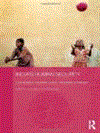

|
|
|
|
|
| Publication |
Oxon, Routledge, 2014.
|
| Description |
xvi, 243p.Hbk
|
| Standard Number |
9780415830683
|
|
|
|
|
|
|
|
|
|
|
|
Copies: C:1/I:0,R:0,Q:0
Circulation
| Accession# | Call# | Current Location | Status | Policy | Location |
| 057757 | 361.954/MIK 057757 | Main | On Shelf | General | |
|
|
|
|
| 7 |
ID:
094677
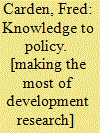

|
|
|
|
|
| Publication |
New Delhi, Sage Publications, 2009.
|
| Description |
xvii, 218p.
|
| Standard Number |
9788178299303
|
|
|
|
|
|
|
|
|
|
|
|
Copies: C:1/I:0,R:0,Q:0
Circulation
| Accession# | Call# | Current Location | Status | Policy | Location |
| 054855 | 338.9/CAR 054855 | Main | On Shelf | General | |
|
|
|
|
| 8 |
ID:
179108


|
|
|
|
|
| Summary/Abstract |
The phenomenon of local knowledge of the fishing community about fish ethology and conservation of existing natural resources are investigated in this article. It explores the inextricably intertwined aspects and long-lasting constructive dependence of marine resources with a symbiotic relationship as critical components for integration with marine ecology. Lastly, the paper emphasizes the significance of local knowledge beliefs and systems which promote natural marine conservation methods for increased economic prosperity. The study focuses on the Telugu marine fishing community in South India.
|
|
|
|
|
|
|
|
|
|
|
|
|
|
|
|
| 9 |
ID:
109705
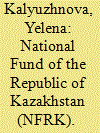

|
|
|
|
|
| Publication |
2011.
|
| Summary/Abstract |
Sovereign Wealth Funds (SWF) have different titles, goals and rules, but they share the underlying objective of helping governments deal with the problems created by large and variable revenues (mainly from energy or other commodity related sectors). In Kazakhstan, such a fund (the National Fund of the Republic of Kazakhstan (NFRK)) was established in 2000. This fund operates as both a stabilisation and a savings fund. The first test for the NFRK was 2007-2009 financial crisis, where the NFRK "saved" the economy and guarantied its speedy recovery. The paper analyses the NFRK's operation up to 2007 and during the crisis years 2007-9, before drawing conclusions and implications for the future. Between 2001 and 2007 the NFRK conservatively accumulated assets, which proved to be useful in limiting the impact of the post-2007 crisis. However, the pre-2007 experience indicated structural weaknesses associated with discretionary executive authority and non-transparency. The paper concludes by observing that this history has created significant challenges for the future.
|
|
|
|
|
|
|
|
|
|
|
|
|
|
|
|
| 10 |
ID:
137825
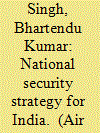

|
|
|
|
|
| Summary/Abstract |
Most great powers have a public document on the National Security Strategy (NSS), meant to navigate the country in anarchical international relations and secure its survival. Invariably, the NSS seeks a conducive strategic environment, identifies the strategic goals and delineates the methodologies for a national response along with resource management. The US, UK, France and Russia come with periodic updates of their NSS2 . China does not have a declared national security strategy but its Defence White Papers published every two years are alternate documents on national security.
|
|
|
|
|
|
|
|
|
|
|
|
|
|
|
|
| 11 |
ID:
159855
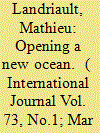

|
|
|
|
|
| Summary/Abstract |
This policy brief focuses on the opening of the Central Arctic Ocean and the subsequent questions this poses to regional governance. This change has the potential to radically alter the nature of Arctic governance as non-Arctic states will have to play a significant role in the rules that will apply in the Arctic high seas. Talks about a regional fisheries regime will define the future of this region. The creation of a coordinating agreement would have the benefit of not challenging Arctic states too fundamentally while at the same time incorporating non-Arctic states in a meaningful way in the regional governance infrastructure.
|
|
|
|
|
|
|
|
|
|
|
|
|
|
|
|
| 12 |
ID:
171909
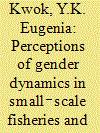

|
|
|
|
|
| Summary/Abstract |
The Tonle Sap Lake of Cambodia is one of the most productive ecosystems in the world, supporting millions of small‐scale fisher livelihoods. Women's contributions in these fisheries are often overlooked due to socio‐cultural expectations of roles and responsibilities. This is a crucial omission since climate and anthropogenic influences increasingly threaten lake inhabitants. Addressing these challenges requires the full participation of both men and women who use the lake, thus it is necessary to first understand the social dynamics of these communities. We investigated whether there were differences between men's and women's perceptions of (i) fishing and non‐fishing practices; (ii) power, access and control over fishing resources; and (iii) perceptions towards conservation and conservation areas in Pursat, Cambodia. We interviewed fishers and key informants, and found differences in perceptions of fishing and non‐fishing practices between fishermen and fisherwomen. Men more openly acknowledged unequal power dynamics, access to and control over fishing resources when compared with women. We found contrasting ideas of community fisheries and conservation between men and women, and health and safety challenges they faced in conservation areas. Findings suggest that community perspectives and unequal power relations established specific roles for women that limited their active participation in fisheries management.
|
|
|
|
|
|
|
|
|
|
|
|
|
|
|
|
| 13 |
ID:
087298
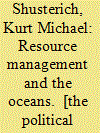

|
|
|
|
|
| Publication |
Boulder, Westview Press, 1982.
|
| Description |
xx, 344p.
|
| Standard Number |
0865319014
|
|
|
|
|
|
|
|
|
|
|
|
Copies: C:1/I:0,R:0,Q:0
Circulation
| Accession# | Call# | Current Location | Status | Policy | Location |
| 020885 | 338.2/SHU 020885 | Main | On Shelf | General | |
|
|
|
|
| 14 |
ID:
123501
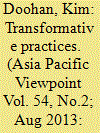

|
|
|
|
|
| Publication |
2013.
|
| Summary/Abstract |
Failure to recognise or acknowledge and respond to local cultural manifestations of Indigenous peoples' attempts to maintain or reassert themselves in spaces of intercultural engagement in resource management denies the power of their own cultural foundations and principles. This paper reviews experience of informal negotiations at the Argyle Diamond Mine in Western Australia. It argues that giving careful consideration to specific cultural practices and processes associated with place and the social relations these practices engender facilitates development of transforming practices that change outcomes.
|
|
|
|
|
|
|
|
|
|
|
|
|
|
|
|
|
|
|
|
|